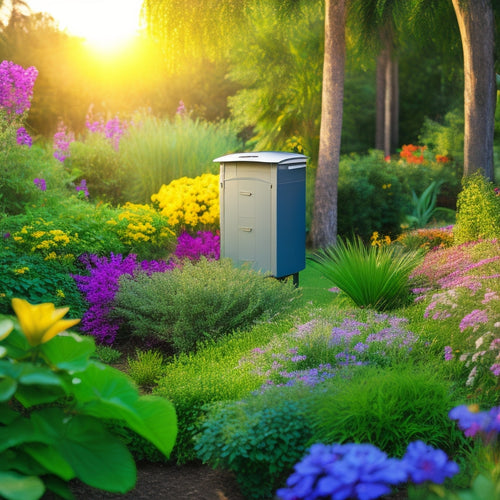
3 Green Gutter Options for Rainwater Collection
Share
You'll want gutter materials that reduce environmental impact, and three green options stand out. Vinyl gutters, made from recycled materials, offer energy-efficient production and reduced waste. Aluminum gutters, with powder-coated finishes, provide durability and minimized material usage. Steel gutters, also with powder-coated finishes, combine strength with eco-friendly stops for optimized rainwater collection. When selecting a gutter system, consider factors like filtration, maintenance, and compatibility with renewable energy sources to maximize your eco-friendly setup. As you investigate these options, you'll uncover more details to inform your decision and streamline your rainwater harvesting process.
Key Takeaways
- Composed of recycled materials, sustainable gutters reduce virgin resource demand and environmental impact.
- Vinyl, aluminum, and steel gutters with powder-coated finishes are popular eco-friendly options for rainwater collection.
- Built-in filtration features and easy maintenance options, like detachable downspouts, ensure clean water collection and reduce clogging.
- Durable materials like aluminum or steel minimize debris accumulation, optimizing rainwater harvesting efficiency.
- Incorporating eco-friendly stops and first flush devices enhances rainwater collection, ensuring clean storage tank entry.
Sustainable Gutter Materials Matter
Many homeowners are switching to sustainable gutter materials, and for good reason. You're likely considering this option too, given the importance of reducing your environmental footprint.
One significant advantage of sustainable gutter materials is their composition: many are made from recycled materials, reducing the demand for virgin resources and the energy required to process them.
Additionally, these eco-friendly gutters often come with longevity benefits, lasting longer than their traditional counterparts. By shifting to renewable energy sources, like solar power renewable energy solutions, homeowners can further reduce their carbon footprint.
This means you'll replace them less frequently, further minimizing waste and conserving natural resources.
Eco-Friendly Gutter Systems Compared
With sustainable gutter materials in place, you're likely wondering which eco-friendly gutter system is best for your home. Comparing different systems can be overwhelming, but it's crucial to evaluate factors like rainwater filtration and gutter maintenance.
Effective recycling programs, like those for solar panels and batteries, can also contribute to a sustainable future recycling costs overview. Look for systems with built-in filtration systems that capture debris and contaminants, ensuring clean rainwater for irrigation and household use.
Additionally, evaluate systems with easy maintenance features, such as detachable downspouts and smooth, rounded edges that reduce clogging. Some popular eco-friendly gutter systems include vinyl, aluminum, and steel options with powder-coated finishes.
Weigh the pros and cons of each material, taking into account durability, cost, and environmental impact. By making an informed decision, you can enjoy the benefits of rainwater collection while minimizing your environmental footprint.
Rainwater Collection Made Easy
Collecting rainwater efficiently requires a well-designed system that streamlines the process from roof to storage tank.
You'll want to verify your gutter system is optimized for rainwater harvesting, as it's the first step in maximizing collection efficiency. A well-chosen gutter material, such as aluminum or steel, will withstand the elements and minimize debris accumulation.
Additionally, incorporating eco-friendly stops with rainwater systems, solar canopies and sustainable road trip amenities can enhance the overall rainwater collection experience.
Next, consider installing a first flush device, which allows the initial flow of water to be diverted, taking any contaminants with it. This guarantees the water entering your storage tank is clean and free of debris.
Frequently Asked Questions
Can Rainwater Collection Systems Be Used for Irrigation in Areas With High Water Tables?
You can employ rainwater collection systems for irrigation in areas with high water tables, but you'll need to implement effective rainwater filtration and guarantee irrigation efficiency to prevent waterlogging and maintain soil health.
Do Green Gutter Options Require More Frequent Cleaning Than Traditional Gutters?
You'll be surprised to know that 75% of gutter-related issues stem from poor maintenance. When it comes to cleaning, you'll find that green gutters require more frequent maintenance due to increased debris accumulation, which can lead to clogs and damage if not addressed regularly.
Are There Any Local Regulations Governing Rainwater Harvesting for Household Use?
You'll need to research local permitting requirements for rainwater harvesting, as they vary by region, considering environmental impact and water quality concerns, to guarantee your household system complies with regulations and maintains freedom from municipal water dependence.
Can I Connect My Rainwater Collection System to My Existing Gutter System?
You'll need to assess your gutter's compatibility with your rainwater collection system before integrating them. Check the gutter's material, size, and slope to guarantee seamless system integration, and consider consulting a professional if you're unsure.
How Long Does It Typically Take to Recoup the Investment in a Rainwater Collection System?
As you begin a voyage towards financial freedom, you're wise to contemplate the ROI of rainwater collection. A thorough cost analysis reveals that your investment typically pays off within 5-10 years, depending on your water usage and local incentives, freeing you from utility bills.
Related Posts
-

3 Best Eco-Grants for Home Energy Upgrades
You're eligible for various eco-grants that can help you cut down on energy bills and reduce your carbon footprint by...
-

Why Choose Solar Composting Toilets for Your Home?
By choosing a solar composting toilet for your home, you'll greatly reduce your environmental impact, slashing your w...
-

10 Best Sustainable Waste Management Solutions for Green Homes
You're likely unaware that the average green home generates over 2 kilograms of waste daily, but with the right susta...


